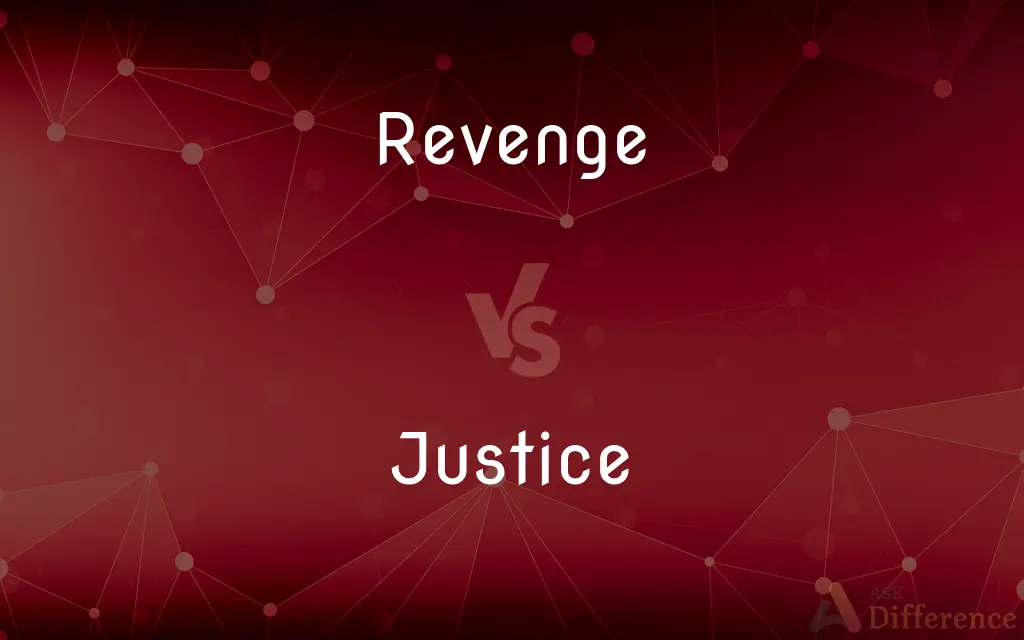Revenge vs. Justice — What's the Difference?
Edited by Tayyaba Rehman — By Urooj Arif — Updated on May 7, 2024
Revenge is driven by personal retribution and often involves emotional responses, while justice seeks to uphold social fairness and legal norms.

Difference Between Revenge and Justice
Table of Contents
ADVERTISEMENT
Key Differences
Revenge is primarily personal, motivated by the desire for retaliation against someone who has caused harm, often leading to actions that mirror the original offense. On the other hand, justice is impersonal and seeks to maintain social order by administering equitable treatment through legal or ethical standards.
In terms of emotion, revenge is fueled by feelings of anger and hurt, leading to potentially harmful actions intended to make the perpetrator suffer as the victim did. Conversely, justice is guided by rationality and impartiality, focusing on restoring balance without personal feelings influencing the outcome.
Revenge often disregards the scale of response, sometimes resulting in actions that exceed the original harm. In contrast, justice aims for proportionality, where the punishment or resolution appropriately matches the severity of the wrongdoing.
The pursuit of revenge can result in a cycle of retaliation, where each party continues to respond with further acts of vengeance. Justice, however, strives to break this cycle by providing a resolution that is accepted by the community and the parties involved, thereby preventing further conflicts.
While revenge can be satisfying in the short term, it typically lacks a formal process and does not guarantee a fair or ethical outcome. Justice, through established legal frameworks, ensures that decisions are based on evidence and legal precedent, promoting fairness and predictability in outcomes.
ADVERTISEMENT
Comparison Chart
Motivation
Personal retaliation
Impartial fairness
Emotional Basis
Driven by anger and hurt
Guided by rationality and impartiality
Response Proportionality
Often excessive or exact mirror of harm
Proportional to the wrongdoing
Cycle
Can perpetuate a cycle of retaliation
Aims to resolve and prevent further conflict
Outcome Assurance
No formal process, unpredictable
Formal legal process, seeks fair outcome
Compare with Definitions
Revenge
Satisfaction from causing the perpetrator to suffer.
He felt satisfied seeing his enemy suffer as part of his revenge.
Justice
Ensures decisions are impartial.
Justice demands impartiality, free from personal biases.
Revenge
Personal retaliation for harm.
He took revenge on his rivals after the betrayal.
Justice
Seeks proportional response.
The sentence was calibrated to ensure justice was served proportionately.
Revenge
Often lacks proportionality.
His revenge was far greater than the original slight.
Justice
Aims to restore social harmony.
The community program was developed to foster justice and reconciliation.
Revenge
May perpetuate conflict.
Their family feud escalated with each act of revenge.
Justice
Fair resolution according to law.
The court's decision brought justice to the aggrieved family.
Revenge
Acts driven by emotional response.
In a fit of rage, her revenge was swift and harsh.
Justice
Based on ethical standards.
The judge acted with justice, considering all factual evidence.
Revenge
Revenge is defined as the act of committing a harmful action against a person or group in response to a grievance, be it real or perceived. Francis Bacon described revenge as a kind of "wild justice" that "does...
Justice
Justice, in its broadest sense, is the principle that people receive that which they deserve, with the interpretation of what then constitutes "deserving" being impacted upon by numerous fields, with many differing viewpoints and perspectives, including the concepts of moral correctness based on ethics, rationality, law, religion, equity and fairness. Consequently, the application of justice differs in every culture.
Revenge
To inflict punishment in return for (injury or insult).
Justice
The quality of being just; fairness
In the interest of justice, we should treat everyone the same.
Revenge
(Archaic) To seek or take vengeance for (oneself or another person); avenge.
Justice
The principle of moral rightness; decency.
Revenge
The act of taking vengeance for injuries or wrongs; retaliation
Took revenge on her tormentors.
Justice
Conformity to moral rightness in action or attitude; righteousness
Argued for the justice of his cause.
Revenge
A desire for revenge; spite or vindictiveness
He did it out of revenge.
Justice
The attainment of what is just, especially that which is fair, moral, right, merited, or in accordance with law
My client has not received justice in this hearing.
Revenge
An opportunity to retaliate, as by a return sports match after a defeat
After the loss, he demanded that he be given his revenge.
Justice
(Law) The upholding of what is just, especially fair treatment and due reward in accordance with honor, standards, or law
We seek justice in this matter from the court.
Revenge
Something done in retaliation, especially a defeat of a rival who has been victorious.
Justice
The administration, system, methods, or procedures of law
A conspiracy to obstruct justice.
A miscarriage of justice.
Revenge
Any form of personal, retaliatory action against an individual, institution, or group for some alleged or perceived harm or injustice.
Indifference is the sweetest revenge.
When I left my wife, she tried to set fire to the house in revenge.
Justice
Conformity to truth, fact, or sound reason
The overcharged customer was angry, and with justice.
Revenge
A win by a previous loser.
Justice
Abbr. J.(Law) A judge on the highest court of a government, such as a judge on the US Supreme Court.
Revenge
(transitive) To take revenge for (a particular harmful action) or on behalf of (its victim); to avenge.
Arsenal revenged their loss to Manchester United last time with a 5–0 drubbing this time.
Justice
The state or characteristic of being just or fair.
The justice of a description
Revenge
To take one's revenge (on or upon someone).
Justice
The ideal of fairness, impartiality, etc., especially with regard to the punishment of wrongdoing.
Justice was served.
Revenge
To take vengeance; to revenge itself.
Justice
Judgment and punishment of a party who has allegedly wronged another.
To demand justice
Revenge
To inflict harm in return for, as an injury, insult, etc.; to exact satisfaction for, under a sense of injury; to avenge; - followed either by the wrong received, or by the person or thing wronged, as the object, or by the reciprocal pronoun as direct object, and a preposition before the wrong done or the wrongdoer.
To revenge the death of our fathers.
The gods are just, and will revenge our cause.
Come, Antony, and young Octavius, come,Revenge yourselves alone on Cassius.
Justice
The civil power dealing with law.
Ministry of Justice
The justice system
Revenge
To inflict injury for, in a spiteful, wrong, or malignant spirit; to wreak vengeance for maliciously.
Justice
A title given to judges of certain courts; capitalized when placed before a name.
Mr. Justice Krever presides over the appellate court
Revenge
To take vengeance; - with
Justice
Correctness, conforming to reality or rules.
Revenge
The act of revenging; vengeance; retaliation; a returning of evil for evil.
Certainly, in taking revenge, a man is even with his enemy; but in passing it over he is superior.
Justice
The quality of being just; conformity to the principles of righteousness and rectitude in all things; strict performance of moral obligations; practical conformity to human or divine law; integrity in the dealings of men with each other; rectitude; equity; uprightness.
Justice and judgment are the haditation of thy throne.
The king-becoming graces,As justice, verity, temperance, stableness, . . . I have no relish of them.
Revenge
The disposition to revenge; a malignant wishing of evil to one who has done us an injury.
Revenge now goesTo lay a complot to betray thy foes.
The indulgence of revenge tends to make men more savage and cruel.
Justice
Conformity to truth and reality in expressing opinions and in conduct; fair representation of facts respecting merit or demerit; honesty; fidelity; impartiality; as, the justice of a description or of a judgment; historical justice.
Revenge
Action taken in return for an injury or offense
Justice
The rendering to every one his due or right; just treatment; requital of desert; merited reward or punishment; that which is due to one's conduct or motives.
This even-handed justiceCommends the ingredients of our poisoned chaliceTo our own lips.
Revenge
Take revenge for a perceived wrong;
He wants to avenge the murder of his brother
Justice
Agreeableness to right; equity; justness; as, the justice of a claim.
Justice
A person duly commissioned to hold courts, or to try and decide controversies and administer justice.
Justice
To administer justice to.
Justice
The quality of being just or fair
Justice
The administration of law; the act of determining rights and assigning rewards or punishments;
Justice deferred is justice denied
Justice
A public official authorized to decide questions bought before a court of justice
Justice
The United States federal department responsible for enforcing federal laws (including the enforcement of all civil rights legislation); created in 1870
Common Curiosities
How do revenge and justice differ in their approach to proportionality?
Revenge may not consider proportionality, often exceeding the initial harm, while justice seeks a proportional and fair response.
What is the primary emotional driver between revenge and justice?
Revenge is driven by personal emotions like anger, whereas justice is driven by a sense of impartiality and fairness.
How does society view revenge compared to justice?
Society typically views revenge as personally satisfying but potentially harmful, whereas justice is seen as necessary for social harmony and fairness.
What is the role of legality in justice as opposed to revenge?
Justice operates within legal frameworks to ensure fairness, unlike revenge, which lacks formal processes.
How does justice aim to prevent future wrongdoing?
Through fair resolution and legal consequences, justice aims to deter future offenses by setting precedents.
Is revenge ever considered legal?
Revenge, by definition, involves personal retribution outside legal sanctions and is generally not considered legal.
What ensures that justice is impartial?
Legal standards and judicial oversight help ensure that justice is administered without personal biases.
Can the pursuit of revenge lead to further conflicts?
Yes, revenge can perpetuate a cycle of retaliation, leading to ongoing conflicts.
What is an example of revenge affecting an entire community?
Feuds fueled by revenge can escalate into widespread violence affecting community peace.
How can revenge impact an individual’s mental health?
Pursuing revenge can lead to continued anger and psychological distress, potentially impacting long-term well-being.
Share Your Discovery

Previous Comparison
Banknote vs. Money
Next Comparison
Adventurer vs. ExplorerAuthor Spotlight
Written by
Urooj ArifUrooj is a skilled content writer at Ask Difference, known for her exceptional ability to simplify complex topics into engaging and informative content. With a passion for research and a flair for clear, concise writing, she consistently delivers articles that resonate with our diverse audience.
Edited by
Tayyaba RehmanTayyaba Rehman is a distinguished writer, currently serving as a primary contributor to askdifference.com. As a researcher in semantics and etymology, Tayyaba's passion for the complexity of languages and their distinctions has found a perfect home on the platform. Tayyaba delves into the intricacies of language, distinguishing between commonly confused words and phrases, thereby providing clarity for readers worldwide.












































